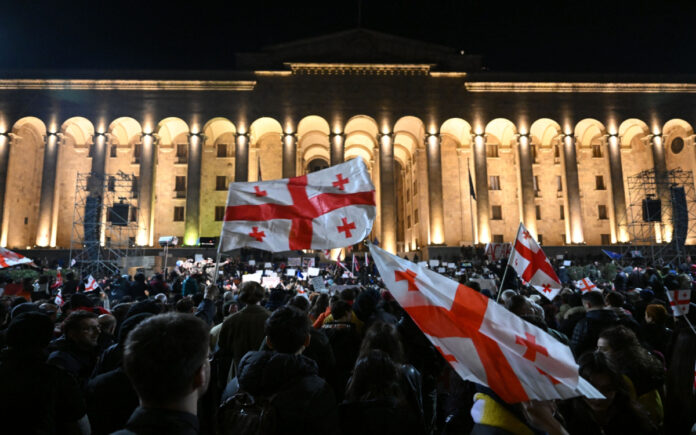Tbilisi: The speaker of Georgia’s parliament confirmed on Monday the enactment of a contentious ‘foreign agents’ bill, stirring weeks of protests from critics who fear it will curtail media freedom and impede Georgia’s EU aspirations.
Shalva Papuashvili signed the bill into law despite President Salome Zourabichvili’s veto being overturned by the legislature, which is dominated by the ruling Georgian Dream party.
The legislation, endorsed by Parliament last month, mandates media outlets, NGOs, and other non-profit entities to register as ‘pursuing the interests of a foreign power’ if they receive over 20% of their funding from abroad.
President Zourabichvili, increasingly at odds with the ruling party, vetoed the bill, denouncing it as a threat to the country’s future and a hindrance to its path towards full integration into the free and democratic world.
While the government asserts the law is necessary to counteract perceived foreign interference destabilizing the nation, many Georgian journalists and activists argue it aims to stigmatize and suppress dissent, particularly in the run-up to October’s parliamentary elections.
Critics dub the legislation “the Russian law”, drawing parallels to Kremlin-enacted measures targeting independent media and civil society. They speculate Moscow’s hand in thwarting Georgia’s Western integration.
Also Read | UK Plans Deportation Flights for Rwanda Asylum Seekers Starting July 23
Prime Minister Irakli Kobakhidze rebuffed criticism as “unnecessary emotions”, urging pragmatism following the law’s implementation.
Over the weekend, the opposition United National Movement alleged an attack by masked assailants linked to the ruling party on its central offices in Tbilisi, prompting an Interior Ministry investigation.
The controversial law closely resembles a previously withdrawn bill following mass protests last year. Renewed demonstrations erupted during its passage through parliament, met with police intervention.
Papuashvili defended the law, emphasizing its aim to bolster Georgia’s resilience against external interference. He stressed the necessity for transparency, asserting that NGOs and media must disclose foreign funding sources to engage in public discourse.
Also Read | China Denies Interference in Ukraine Peace Summit Attendance
The Georgia Civil Society Foundation intends to challenge the law in the constitutional court.
Criticism from the EU and the US State Department underscores international concerns. The EU cautioned that the law undermines Georgia’s EU aspirations, while US Secretary of State Antony Blinken announced travel sanctions against Georgian officials involved in undermining democracy.
The ruling Georgian Dream party vehemently denies allegations of pro-Russian leanings, despite its founder, Bidzina Ivanishvili’s ties to Russia.
Tensions between Russia and Georgia, marked by the 2008 war over South Ossetia, persist. While relations have improved, the status of South Ossetia and Abkhazia remains contentious.



